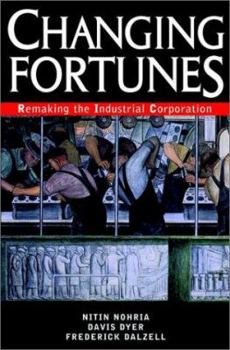Changing Fortunes: Remaking the Industrial Corporation
One of the first books to address the role large corporations will play in the coming century Over the last twenty-five years, an enormous change has occurred in the landscape of business-the rise and... This description may be from another edition of this product.
Format:Hardcover
Language:English
ISBN:047138481X
ISBN13:9780471384816
Release Date:April 2002
Publisher:John Wiley & Sons
Length:336 Pages
Weight:2.35 lbs.
Dimensions:1.1" x 6.5" x 9.6"
Customer Reviews
1 rating
Superb description and analysis--a must-read
Published by Thriftbooks.com User , 21 years ago
Changing Fortunes makes a solidly researched, reasoned, and documented case that large economic institutions-manufacturing corporation in this case-have a skewed bell-shaped curve of evolution. Each curve emerges almost unnoticed out of the debris of a fading economic institution-frontier agriculture in the case of the medieval Church, religion in the case of the Enlightenment, and piecework in the case of manufacturing. It rises rapidly to previously unimaginable heights of power and prestige (as peas in a pod, cathedrals and high rises are separated only by centuries), and then begins a long decline that never quite ends in demise (Christmas and Easter are relics of paganism, not the progency of a new religion). The reasons for the decline are varied and many, but several threads seem ever present: selfish interest replaces collective interest (American politics), accountability shifts from external to internal (American business), the network effect grows too inwardly dependent (Japan), and the life support of the whole thing-the everyday Joes and Joannes-feel more and more betrayed as they watch corruption replace commonweal. The shabby little personal deals these days between CEOs and Congressmen reminds one of the commerce in Church offices during the 14th through 16th centuries, which led to unprecedented levels of disproportion between principle and practice. The book Silent Theft by William Bollinger comes to many of these same conclusions from the commonweal-holder's point of view. Changing Fortunes documents its case very well. It is so lucidly written that typically leaden case studies are polished into brilliance by blunt, often witty assessments of corporate goofs. No softening the blow with genial dollops of well-wishing comes from this trio. And of goofs, boy are there some dandies. The sequence of awful decisions that took Xerox from poster-child of TQM (Total Quality Management) revolution of the 1980s to the blunderer of 2000 that shredded both their billing system and customer loyalty makes one chortle, but behind management's arrogant imbecilities are unemployment lines.The book is a goldmine of facts. Between 1982 and 1992 the number of U.S. business consultants went from 30,000 to 81,000 (if you can't do it, teach it). In 1998 102,171 MBAs graduated from American universities (enough to populate a medium-size city, and wouldn't that be a dull place). Such statistics hint at the explosion in business information and expertise now revolutionising U.S. corporate life. Yet how many bright young things lust for life at a widget factory? The authors cite many examples of manufacturing sector decline, but in the end the example they don't cite is the most telling of all: employment in the manufacturing sector is at its lowest point since 1961, and out-of-work statistics have risen every month for the last 27. Somebody's hurting, and it's not the guys at the top. Now recall that every seismic shift in thinking in the West since Rom




